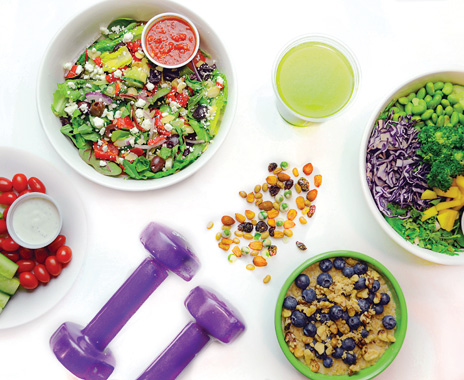As limited-service restaurants face increasing competition from the exploding meal-delivery market, more chains are jumping into the fray and launching meal subscription plans of their own. Much of the activity so far has been in the health-focused realm, as chains look to attract time-strapped consumers seeking wholesome meals without the effort.
“People are really active today, and not just health-conscious people,” says Rod Silva, founder of fast-casual franchise Muscle Maker Grill. “The busier we get, the less we cook. We need food to be convenient. We want to make good choices without having to wonder where our next meal is coming from or when.”
In 2015, Muscle Maker Grill rolled out its dietician-approved Meal Plan, which features 22 items from its menu—ranging from a salad with chicken breast, turkey bacon, and reduced-fat Cheddar to a grilled chicken breast and turkey meatball wrap with marinara—at an average cost of $7. Meals can be pre-ordered for delivery or pickup via phone or online.
Between 10 and 15 percent of the chain’s regular customers have converted to the plan since the rollout, and Silva says many got started on it through a promotional bundle of two meals plus a healthy snack for $19.95. The chain, which launched in 1995 to a customer base primarily comprising athletes, has since looked to broaden its market appeal. The new meal plans have helped Muscle Maker reach new customers.
“The No. 1 thing that we can really innovate in this marketplace is to come out with quality food, like all-natural chicken and organic ingredients,” Silva says. “Once you get the other factors in line—nailing the visual aspect, controlling for calories but still giving a satisfying meal that hits all your macro [nutrients] correctly, keeping food costs in line—you have to make it as affordable as possible.”
In February, Toronto-based Freshii launched a meal subscription plan, mostly in response to customer requests. In-house nutritionist Andie Shapira developed four Meal Boxes to suit different dietary missions—for cleaner eating (“clean”), slimming down (“slim”), bulking up (“bulk”), and gluten-free. Each box contains a few choices for breakfast, lunch, dinner, and two snacks for one ($40), three ($118), five ($190), or 30 days ($1,050).
The meal boxes have taken off quickly, Shapira says, adding that the customizability has been the most popular aspect.
“Adding that element of customization, or targeting a specific dietary goal, makes a huge difference for people,” she says. “Whether promising they’re going to lose weight, build muscle, or making it easier for people who have allergies or can’t eat gluten, we lay it out and give them tons of options.”
My Fit Foods also offers healthy grab-and-go meals (ranging from $5 to $12) for consumers with specific health goals, like weight loss or addressing a health concern. But a lot of customers use the chain’s meal plans as a healthier alternative to takeout, says CEO David Goronkin.
“Today’s consumer is leading a busier-than-ever lifestyle, and on-the-go meal options have become more prevalent,” he says. “With that, consumers are seeking simple, nutritious, and convenient meals for when they don’t want to cook.”
All 50 My Fit Foods locations have a nutrition coach on staff offering complimentary meal-planning services to help customers, which Goronkin says has cemented customer loyalty.
With calls for on-demand food on the rise, My Fit Foods is planning to expand delivery in the next few months to all markets. It’s available to Amazon Prime users in Chicago, and customers in Texas can order through third-party app Favor Delivery.
One of the biggest challenges of tackling fresh meal delivery is just that: freshness. All of Freshii’s box contents undergo rigorous testing months before launch to ensure they can stand up to delivery and consumer handling, Shapira says. Meals are prepared ahead of time and are tested for quality and freshness at different time intervals.
Muscle Maker Grill purchased a technology company last year to help it develop state-of-the-art software linking back-of-house production to reporting, as well as to an app that keeps customers informed about delivery status and subscription renewal.
“The kitchen will get a daily list of what needs to be prepared, for whom, along with expiration dates, which will dramatically reduce the labor cost it will take us to produce higher volumes. We want to make food as close to delivery time as possible because we’re not freezing the meals or using preservatives,” Silva says.
Seeing big potential in the meal subscription market—especially as increasingly phone-averse consumers flock to online ordering—Muscle Maker Grill has big ambitions for its meal-plan business. Silva hopes for it to account for 30 percent of the chain’s existing business within the next year or two. He’d also like to see the meal-plan program attract new customers.
“When talking about people on the go for lunch, we feel like everything from [quick service] to fast casual is competition,” Silva says. “We have an opportunity two times a day, seven times a week, to get people’s business. We’re trying to cut into the frequency that they opt for a burger, pizza, or a sub.”
And as consumers raise their expectations regarding “convenience” food (as evidenced by meal kits like Blue Apron, which sold well over 1 million meals each month last year), mainstream brands have an opportunity to tap into that market.
“Hybrids have become really popular, and Meal Box is just that: a hybrid between Jenny Craig and a food-delivery service. I think there’s so much potential here, and I definitely think we’ll see more fast-casual restaurants get on board,” Shapira says.










